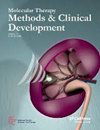投稿信息
稿件收录要求
Molecular Therapy
Molecular Therapy is the leading journal for research in the areas of gene transfer, vector development and design, stem cell manipulation, development of gene-, peptide-, protein-, oligonucleotide-, and cell-based therapeutics to correct genetic and acquired diseases, vaccine development, pre-clinical target validation, safety/efficacy studies, and clinical trials. Molecular Therapy is dedicated to promoting the sciences in genetics, medicine, and biotechnology. Publishing important peer-reviewed research and cutting-edge reviews and commentaries, the journal continues to attract the best material in the field. Molecular Therapy''s 2015 impact factor is 6.938.
Molecular Therapy — Methods & Clinical Developments
The aim of Molecular Therapy—Methods & Clinical Development is to build upon the success of Molecular Therapy in publishing important peer-reviewed methods and procedures, as well as translational advances in the broad array of fields under the molecular therapy umbrella.
Topics of particular interest within the journal''s scope include:
- Gene vector engineering and production
- Methods for targeted genome editing and engineering
- Methods and technology development for cell reprogramming and directed differentiation of pluripotent cells
- Methods for gene and cell vector delivery
- Development of biomaterials and nanoparticles for applications in gene and cell therapy and regenerative medicine
- Analysis of gene and cell vector biodistribution and tracking
- Pharmacology/toxicology studies of new and next-generation vectors
- Methods for cell isolation, engineering, culture, expansion, and transplantation
- Cell processing, storage, and banking for therapeutic application
- Preclinical and QC/QA assay development
- Translational and clinical scale-up and Good Manufacturing procedures and process development
- Clinical protocol development
- Computational and bioinformatic methods for analysis, modeling, or visualization of biological data
- Negotiating the regulatory approval process and obtaining such approval for clinical trials




